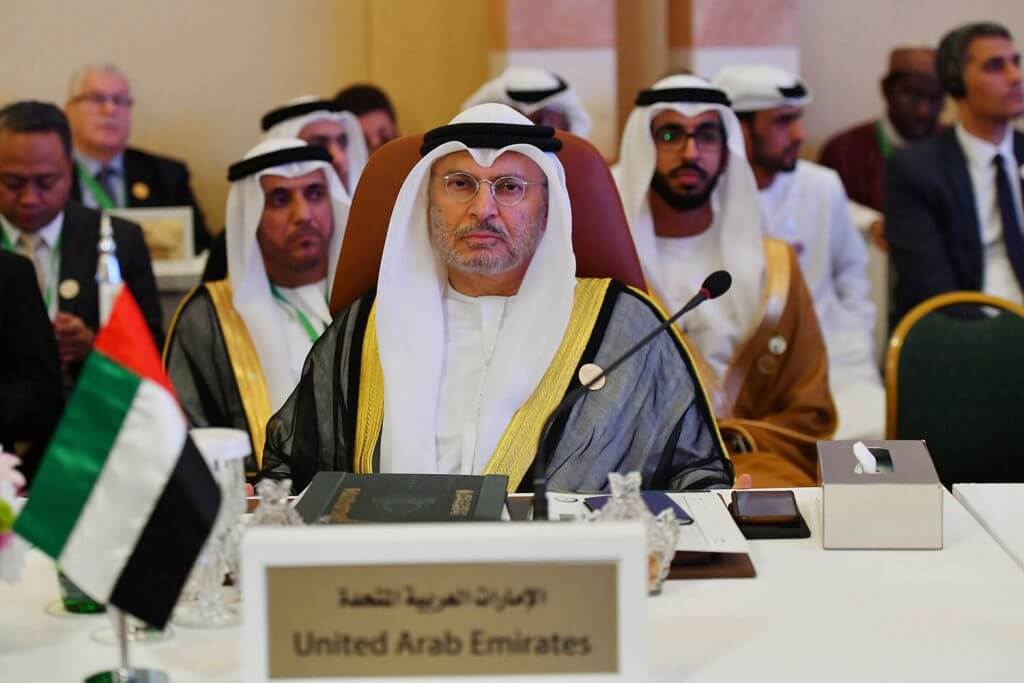Emirati Presidential advisor Anwar Gargash on Monday called on the United States (US) to make “clear, unambivalent” security commitments to the United Arab Emirates (UAE).
Speaking at the Abu Dhabi Strategic Forum, Gargash noted that while the UAE-US alliance has been “close and mutually beneficial for decades,” it is “vital that we find a way to ensure that we can rely on this relationship for decades to come through clear, codified and unambivalent commitments.”
Relations between the two allies have soured over the last few years, with Abu Dhabi and Washington accusing each other of taking steps to undermine their partnership. Last year, the UAE cancelled a $23 billion F-35 fighter jet deal with the US, saying it violates the UAE’s sovereignty. Washington was willing to provide F-35s only if the UAE agreed to use them in locations approved by the US.
Tensions also ran high after the US blamed the UAE and Saudi Arabia for indiscriminately bombing civilian areas in Yemen and worsening the country’s humanitarian crisis. In 2021, the Biden administration removed American missile systems deployed in the two Arab countries and halted the sale of offensive weapons.
Washington reversed the restrictions earlier this year but tensions have remained.
Essential message of strategic autonomy, national sovereignty from @AnwarGargash at @EmiratesPolicy Abu Dhabi Strategic Debate. Describes UAE as medium power. Strong assertion of independence from US regional hegemony, priority of economic security. https://t.co/UhK8efantA pic.twitter.com/38S0sKURbZ
— Karen Young (@ProfessorKaren) November 14, 2022
Against this background, Gargash asked the US to become steadfast in its commitment to its allies, insisting that the UAE “has no interest in choosing sides between great powers.”
Gargash emphasised that the UAE’s “primary strategic security relationship remains unequivocally with the US” but said it would pursue a “multilayer approach” and maintain “balanced and diversified economic partnerships in a multipolar world.”
“The President [Mohammed bin Zayed] understands that we are more secure because we do not rely on just one pillar for our security,” he stressed, adding, “Currently, we are not dependent on just one or two countries for both our economic prosperity and our security. Our trade relations increasingly look to the East, while our primary security and investment relations in the West.”
Gargash claimed that “this situation may evolve over time.”
HE Dr @AnwarGargash, Diplomatic Advisor to #UAE President, at the @EmiratesPolicy Abu Dhabi Strategic Debate #ADSD2022 pic.twitter.com/SOYjAh7Hse
— Afra Al Hameli (@AfraMalHameli) November 14, 2022
Recently, the US’ Gulf allies, particularly the UAE and Saudi Arabia, have improved relations with its rivals China and Russia. Abu Dhabi has signed a host of economic and commercial agreements with Beijing, including integrating the Gulf country with China’s flagship Belt and Road Initiative (BRI).
Saudi Arabia, too, has stepped up economic, defence, and political cooperation with China. In fact, before the Ukraine war, Riyadh became Beijing’s top oil supplier, with China importing 25% of Saudi Arabia’s total oil exports. According to reports, Beijing is helping Riyadh build ballistic missiles. In addition, Saudi Crown Prince Mohammed bin Salman last year called on China to merge the BRI with Saudi Arabia’s Vision 2030 programme.
Tensions with the US further escalated last month after the Saudi-led Organization of Petroleum Exporting Countries (OPEC) and its allies decided to cut oil production by two million barrels per day. The US accused Saudi Arabia and the US of destabilising the global energy market, warning that such a move would raise energy prices. The US also said OPEC’s move would allow Russia to fund its war against Ukraine.
Saudi Arabia, the UAE, and other Gulf countries rejected US accusations and said the move was not political.
Last week, the US published a classified report, accessed by the Washington Post, blaming the UAE for trying to manipulate US policies. According to the Post, Abu Dhabi has used “illegal” attempts to shape US foreign policy.

